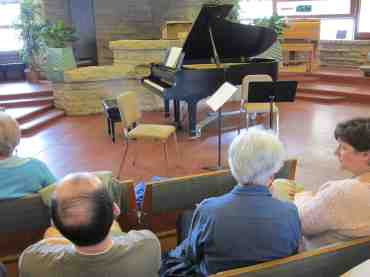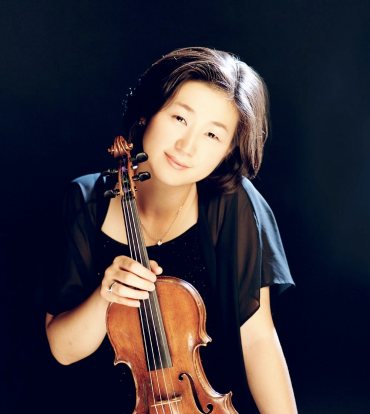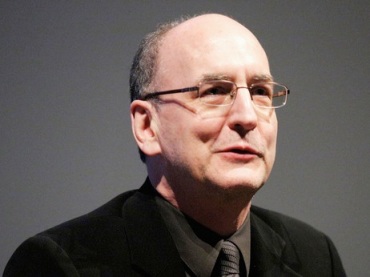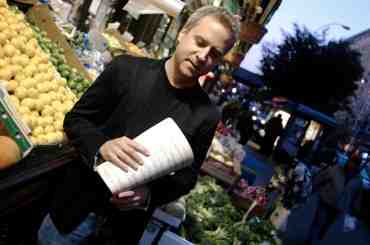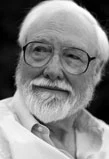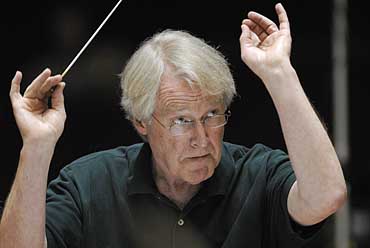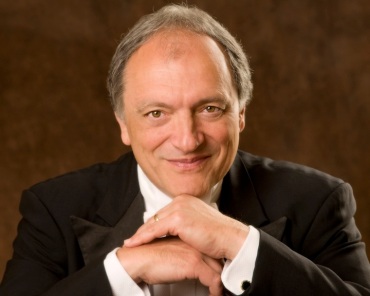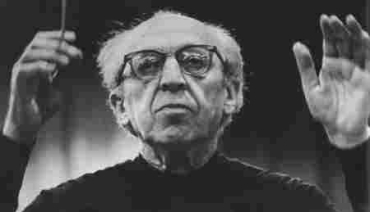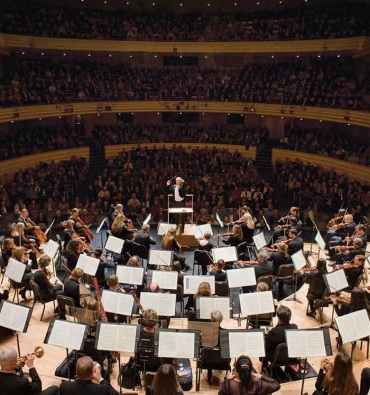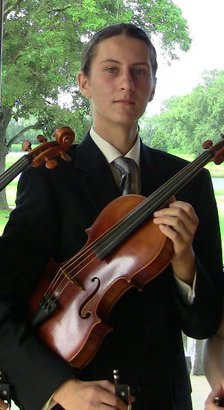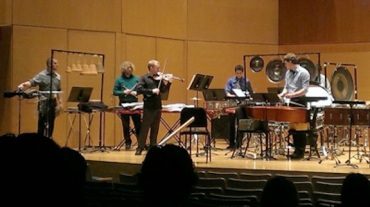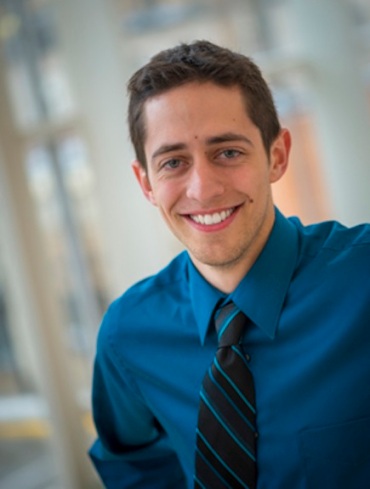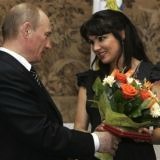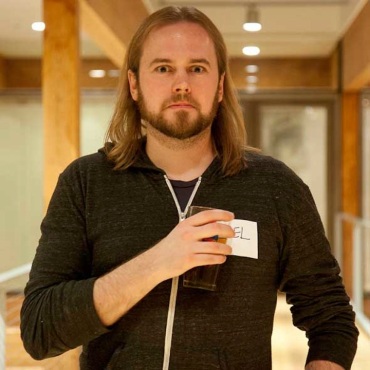The Well-Tempered Ear
Classical music Q&A: The FREE Friday Noon Musicales start again this week at the First Unitarian Society of Madison. FUS music director Dan Broner discusses how the programs come together. Plus, the UW Chamber Orchestra performs a FREE concert of Schumann, Haydn and Wagner on Tuesday night.
2 Comments
REMINDER: The UW Chamber Orchestra (below) performs a FREE concert tomorrow, on Tuesday night, Oct. 1, at 7:30 p.m in Mills Hall. The program, under conductor James Smith, features Robert Schumann’s “Overture, Scherzo and Finale,” Franz Joseph Haydn’s Symphony No. 88 and Richard Wagner‘s “Siegfried Idyll.”
By Jacob Stockinger
Madison has so much fine free music to offer listeners, especially at the University of Wisconsin School of Music through the Faculty Concert Series and various student groups.
But one of the most enjoyable events is also one of the most low-profile.
I am speaking about the weekly Friday Noon Musicales (below) that take place in the Landmark Auditorium of the First Unitarian Society’s historic Meeting House, near University Hospital, at 900 University Bay Drive off, just University Avenue on the city’s near west side.
It is not surprising that the Friday Musicales exist because the Unitarians in Madison — which has the highest concentration of Unitarians in the U.S. — always place a major emphasis on music, as did its famous architect Frank Lloyd Wright. (An excerpt from an All-Mozart Sunday is in a YouTube video at the bottom.)
You can bring lunch, drink coffee or tea, or, as I do, eat before and take along a small dessert.
But so often the midday music concert is itself the dessert, the real treat. Imagine the fun of hearing live music for a daytime break. It is like a parenthesis, a time-out or an oasis in the day. Often I have walked into the concert with less enthusiasm and energy than I left with. The music recharges me and provides a spark to get through the rest of the day.
The setting and presentation are informal. But I have found the audiences very appreciative and generally quiet and well-behaved, though sometimes the knitters and readers, especially if they are in the front rows, strike me as rude and disrespectful to the performers.
I have heard singers and solo pianists, string trios and string quartets, all kinds of soloists and ensembles and music.
The Musicale series starts again this week, this Friday Oct. 4. So The Ear asked the First Unitarian Society’s music director Dan Broner to provide some background.
The many-talented Broner (below) not only plans the concerts and performers, he also plays the pianist himself as an accompanist in many of the concerts.
Here is Dan Broner’s email Q&A with The Ear:
How long have the Free Friday Noon musicales been held? Are they expensive to put on and how are they funded?
They have been held since 1987. They are an outreach program to the community and funded by the First Unitarian Society’s operating budget. The costs are that portion of my salary for administering and performing in the series, plus piano tuning and minimal utility expenses.
The musicians donate their services, and the 45-minute concerts (they run 12:15 to 1 p.m.) are free and open to the public.
How successful have they been? What is the typical attendance and how it is trended in recent years? Do certain kinds of concerts (instrument, voice, program, performer) attract a bigger or smaller audience?
The Musicales attract listeners of all ages, but are particularly attractive to seniors, and workers who can attend during their lunch break.
They regularly attract between 50 and 75, numbers, which have been consistent for the past 11 years of my tenure.
Attendance would most likely be higher if it we had more parking. But we share the lot with the Meeting House Nursery School, which limits availability.
Generally instrumental performances attract a larger audience, and more well-known artists will generate a larger crowd as well.
What do you hear from the public as a reaction to the concerts?
Almost every week I will receive favorable comments from attendees who enjoy the Musicales. Some have stated that they are their favorite musical events.
The Musicales are scheduled between October and May and many folks have said that they are eager for the season to begin.
How do you line up artists and programs? Do they come to you or you come to them?
Many artists contact me. They are attracted by the historic Frank Lloyd Wright landmark venue (below): the architecture, acoustics and the fully restored 1889 Steinway Model A grand piano.
Often they are students and teachers from the University of Wisconsin School of Music and other area universities who would like a trial run of recitals they are preparing.
Every summer I send out an email to every artist who has performed in the series and many elect to perform again.
Are there special programs you would like to point out for the current season?
There are many intriguing musicales this season, but a few do stand out for me personally. I’m eager to hear the young Madison pianist Garrick Olsen (below top), who is playing on Dec. 6. I always enjoy hearing the fine violinist, Kangwon Kim (below middle), and I look forward to collaborating with her on the Johannes Brahms’ Sonata in G for Violin and PIano on Friday, Jan. 10.
The fine Chicago area virtuoso pianist Mark Valenti will be performing at the Musicales for the first time on Jan. 31. Madison native pianist Kathy Ananda-Owens, from the St. Olaf College music faculty, plays on Feb. 7 and the Black Marigold Woodwind Quintet (below bottom), which is always fun, performs on March 14.
Is there anything else you would like or add or say?
Thank you for the opportunity to comment on this unique series. We welcome new listeners and musicians interested in performing.
Please join us for the first Musicale on this Friday, October 4, at 12:15 p.m. Violist Shannon Farley (below), with guitarist Christopher Allen and pianist Greg Punswick, will be performing music of J.S. Bach, Franz Schubert, Robert Schumann and Cesar Franck.
Tags: Cesar Franck, Concert, First Unitarian Society of Madison, Frank Lloyd Wright, Franz Joseph Haydn, Franz Schubert, Friday, J.S. Bach, Johannes Brahms, Madison, Madison Wisconsin, Piano, Richard Wagner, Robert Schumann, Siegfried Idyll, St. Olaf College, symphony, Unitarianism, University of Wisconsin–Madison, Viola, Violin, Wisconsin, Wolfgang Amadeus Mozart, YouTube
Classical music: Which opera villain would Vladimir Putin be? Plus, the Madison Symphony Orchestra’s last performance of its acclaimed opening concert is TODAY at 2:30 p.m.
2 Comments
A REMINDER: The last performance of the season-opening concert by Madison Symphony Orchestra (below in a photo by Greg Anderson) takes place at 2:30 p.m. today in Overture Hall. The program of Aaron Copland’s dance suite “Appalachian Spring,” Richard Wagner‘s “Love Death” (Liebestod) from the opera “Tristan und Isolde” and Nikolai Rimsky-Korsakov‘s symphonic tone poem “Scheherazade” celebrates the 20th anniversary of conductor John DeMain‘s tenure. And the performances have received rave reviews. Here are links to reviews by John W. Barker of Isthmus and Greg Hettmansberger of Madison Magazine:
http://www.thedailypage.com/daily/article.php?article=41041&sid=7853c5de52499cbd8d735576acaa10e0
By Jacob Stockinger
You may recall that last weekend I asked whether we should boycott the performances and recordings of superstar soprano Anna Netrebko (below top) and globe-trotting conductor Valery Gergiev (below bottom) because they supported the election of Vladimir Putin, the thuggish former KGB agent who is the scheming and vicious President of Russia.
There is a lot to complain about Vladimir Putin (below, pictured on a poster in a pro-=gay rights protest) and his record of injustice, human rights and political intrigues. In particular, putting aside questions of Syria and internal Russian dissent, I chastised Netrebko and Gergiev for not standing up to and not speaking out about Putin’s support of extremely harsh and oppressive anti-gay laws in Russia, especially both musicians no doubt work with and depend on gay and lesbian colleagues in performing artists.
The comments led to some pretty heated responses from various readers.
Here is a link so you can see for yourself:
Then a god friend and loyal, knowledgeable reader of the blog, who is on a bicycling tour of Hungary, checked in and sent on a link to a piece about how opera houses – including the famed Metropolitan Opera in New York City — have been asked to sign petitions and at least dedicate their opening night performances against Putin and his supporters.
The Met’s general director Peter Gelb (below) refused, pleading that the arts are separate from politics, and some other opera leaders agreed with him. Well, what do you expect from management?
Here is a link to that fascinating story in the Wall Street Journal:
The whole idea of Vladimir Putin (below) as an opera villain got me thinking: Which villain in the opera repertoire best parallels or embodies Vladimir Putin, seen as a parody of himself as a real-life bare-chested macho man in the photo below top? (The beef-cakey baritone Nathan Gunn, below bottom) would be an ideal choice to cast int the role no?)
Could Putin be the infamous Scarpia (below, as sung by Dmitri Hvorostovsky in a popular YouTube video) who tortures and kills opponents in Giacomo Puccini’s “Tosca”?
Could he be the notorious Duke of Mantua who betrays his friend in Giuseppe Verdi’s “Rigoletto”?
Or maybe Mephistopheles in Charles Gounod’s “Faust”?
Perhaps Modeste Mussorgsky’s Boris Godunov as leader who runs astray of the law and the people?
And there many other villain who kill, torture and betray.
In fact, to help you decide here is a list – by no means complete – of the Top 10 opera villains as provided by the famed radio station WQXR FM in New York City.
http://www.wqxr.org/#!/story/167716-top-10-opera-villains/
Maybe you can think of others?
And just maybe we will see a contemporary opera composed that is based on Putin. Why not, The Ear asks, since recently world premiere of a commissioned opera ‘”Anna Nicole” based on the glittery and totally superficial life of the trashy Anna Nicole Smith recently took place at the Royal Opera in London?
Anyway, which opera villain do you think best embodies Vladimir Putin?
And could the real Vladimir Putin himself serve as a villainous role in a new and contemporary opera?
The Ear wants to hear.
Tags: Aaron Copland, Anna Netrebko, Appalachian Spring, Charles Gounod, Dmitri Hvorostovsky, Faust, gay, Gay Lesbian and Bisexual, gay rights, Giuseppe Verdi, human rights, John DeMain, lesbian, Liebestod, Love-Death, Madison Symphony Orchestra, Metropolitan Opera, Modeste Mussorgsky, Nathan Gunn, New York City, Nikolai Rimsky-Korsakov, Overture Center, Peter Gelb, protest, Putin, Richard Wagner, Rigoletto, Russia, Syria, Tosca, Tristan und Isolde, Valery Gergiev, Vladimir Putin, YouTube
Classical music: Season-openers continue this weekend as Fresco Opera Theatre presents the “Paranormal Playhouse” this Friday, Saturday and Sunday at the Playhouse in the Overture Center. Plus, the Kat Trio plays a FREE concert at Grace Presents at noon on Saturday and the Edgewood Chamber Orchestra performs Rossini, Haydn and Arvo Part on Sunday afternoon.
2 Comments
ALERT: A new season of Grace Presents gets underway this Saturday at noon with a FREE hour-long concert at Grace Episcopal Church, 116 West Washington Avenue, downtown on the Capitol Square. The Kat Trio (below, with a different pianist) has a long history in Madison and consists of violinist Victoria Gorbich, clarinetist Vladislav Gorbich and pianist Justin Snyder. The program includes works by Aram Khachaturian, Johannes Brahms, Alexander Glazunov, Jean Sibelius, Peter Tchaikovsky and Dmitri Shostakovich as well as unique Russian arrangements and transpositions of classical works, well-known inspirational songs, and even American pop standards (from “Fiddler on the Roof”) and rags by Scott Joplin. For more, visit: www.thekattrio.net
Next Up at Grace Presents: On Saturday, October 26, at noon, tenor Daniel O’Dea and soprano Marie McNamara will perform. Support for Grace Presents comes from donations, Dane Arts and the W. Jerome Frautschi Foundation.
By Jacob Stockinger
As I said earlier this week, even though the concert season officially started with chamber music many classical music fans wait for big groups, bigger pieces and bigger audiences to see that the season is really underway.
Symphonies orchestras are well represented this weekend, what with three performances by the Madison Symphony Orchestra plus the University of Wisconsin Symphony Orchestra’s centennial homage to Igor Stravinsky’s “Rite of Spring” on Sunday night.
But two other notable events add to the dynamic.
One is the first opera of the new season.
It is “Paranormal Playhouse,” to be presented Friday, Saturday and Sunday on the Playhouse at the Overture Center.
Here is more from an official press release:
“Fresco Opera Theatre has transformed the Overture Center Playhouse into a shell of its former self. The space is haunted by spirits of operas past, including performers who have met untimely deaths, evil spirits who sabotage those who get in their way and mysterious souls who are untraceable.
Patrons are being scared to death. The Overture Center needs help, and who are they going to call?
“Fresco has the answer. A.R.I.A. (Apparition Removal Investigation Association) will find the spirits and the stories behind their inhabiting the Playhouse.
“Fresco knows you will be moved by the stories of these unfortunate souls as they sing to the audience they long for. But be warned. As you are drawn in to these beautiful spiritual voices, something else evil is lurking…
“Opera shouldn’t be scary. No one knows this better than Fresco Opera Theatre.”
Sorry, I have no specifics about arias and other specific works and composers to be sung. For more information about this production and past productions as well as photos of the Fresco Opera Theatre, visit:
http://www.frescooperatheatre.com/paranormal-playhouse.html
The “Paranormal Playhouse” project is made possible with support from the Dane County Cultural Affairs Commission (Dane Arts), Madison Arts Commission, and its generous donors.
ALSO: At Edgewood College this Sunday afternoon at 2:30 p.m. in the St. Joseph Chapel, 1000 Edgewood College Drive, the Edgewood Chamber Orchestra (below top) will perform under the direction of Blake Walter (below bottom).
The program features Rossini’s Overture to “La Cambiale di Matrimonia,” Franz Joseph Haydn’s Symphony No. 87 and Arvo Pärt’s “If Bach Had Been a Bee-Keeper” (At the bottom in a YouTube video.)
Admission is $5, or free with an Edgewood College ID.
Tags: Alexander Glazunov, Aram Khachaturian, Arvo Part, chamber orchestra, Dmitri Shostakovich, Edgewood College, Episcopal Church, Fresco Opera Theatre, Gioacchino Rossini, Grace Episcopal Church, Igor Stravinsky, Jacob Stockinger, Jean Sibelius, Johannes Brahms, Kat Trio, London, Madison, Madison Symphony Orchestra, opera, Orchestra, Overture Center, Rite of Spring, Scott Joplin, Sunday, University of Wisconsin–Madison, YouTube
Classical music Q&A: University of Wisconsin conductor James Smith discusses the program of Beethoven, Stravinsky and Sibelius that the UW Symphony Orchestra will perform at a FREE concert this Sunday at 7:30 p.m. Also, UW soprano Elizabeth Hagedorn will sing Mahler songs in a FREE concert Thursday afternoon at the Wisconsin Institutes for Discovery, plus a WORT-FM show on Thursday morning highlights the Madison Symphony Orchestra and its music director John DeMain.
1 Comment
TWO ALERTS: On this Thursday afternoon at 4:30 p.m. in the Wisconsin Institutes for Discovery, UW-Madison dramatic soprano Elizabeth Hagedorn (below) — filling in for soprano Julia Faulkner, who is on a leave-of-absence this academic year — will make her local debut. The FREE concert features her singing Gustav Mahler‘s moving “Rueckert Songs” with UW pianist Martha Fischer. It is part of the Wisconsin Science Festival that combines science lectures and live classical music in the SoundWaves program that is organized and directed by UW horn professor Daniel Grabois. For more information, visit the outstanding “Fanfare” blog at the UW School of Music: Here is a link:
http://uwmadisonschoolofmusic.wordpress.com/2013/09/13/soundwaves9-26-2013/
And here are links to more stories about Elizabeth Hagedorn:
http://uwmadisonschoolofmusic.wordpress.com/2013/08/19/hagedorn/
ALSO: Blog friend and radio host Rich Samuels (below) writes: “On this Thursday morning, Sept. 26, beginning at 7:08 a.m. on my weekly show “Anything Goes” that is broadcast from 5-8 a.m. on WORT 89.9 FM. I’ll be airing an interview I recently recorded with the Madison Symphony Orchestra’s music director John DeMain (the MSO’s 2013-2914 concert season begins, of course, on this Friday and Saturday nights and Sunday afternoon.
“Maestro DeMain talks about his transition from the Houston Grand Opera to the Madison Symphony Orchestra and about the artistic state of the orchestra as he begins his 20th season on the podium.
“Music for the segment will include selections from DeMain’s 1996 Grammy award-winning recording the Houston Grand Opera made when its production of George Gershwin’s “Porgy and Bess” was playing Broadway.
“Half the segment deals with the upcoming season and some of the younger soloists who will be heard between now and next May. We’ll hear performances by Norwegian trumpeter Tine Thing Helseth, violinist Augustin Hadelich, soprano Emily Birsan and the young Madison pianist Garrick Olsen (not to be confused with pianist Garrick Ohlsson).”
By Jacob Stockinger
This is the week of orchestral season debuts. Yesterday, The Ear spotlighted the Madison Symphony Orchestra’s concerts this weekend.
But at 7:30 p.m. in Mills Hall on this Sunday evening — on what The Ear calls “Symphony Sunday” with performances by the Madison Symphony Orchestra, the UW Symphony Orchestra and the Edgewood College Chamber Orchestra — the University of Wisconsin-Madison Symphony Orchestra will perform a FREE concert under its longtime director James Smith, who also directs the UW Chamber Orchestra and is the music director of University Opera.
Smith recently granted The Ear an email Q&A about the concert:
You programmed “The Rite of Spring” by Igor Stravinsky (below) because this is the centennial year of its world premiere. How important is that work in the symphonic repertoire and to music history in general?
It is often cited as a landmark work in all respects. Several faculty members mentioned that we ought to perform it so that the students can appreciate its impact. At the time, 1913, the harmonies, the savage rhythms and the choreography were all quite jolting to the Paris audiences.
Right from the start, the bassoon explores a new range for the instrument as it sets the stage for the pagan ritual ahead.
How challenging technically is the “Rite of Spring” in general to perform but especially for UW undergraduate students? What makes it such a difficult work?
It is difficult on all levels: rhythmic, technical and tessitura (the comfort range of notes for a specific kind of voice or instrument).. We have performed works by Bohuslav Martinu, Alban Berg, Anton Webern and Gustav Mahler who also posed special difficulties. The students are working very hard outside of the rehearsals so that we can all experience this exciting work. (Below is a photo of the UW Symphony Orchestra performing with the UW Choral Union plus a link to a video by Kathy Esposito, concert manager and public relations director at the UW School of Music, of the UW Symphony Orchestra and conductor James Smith rehearsing “The Rite of Spring” that Esposito posted on Facebook.)
https://www.facebook.com/photo.php?v=632954003411618
Why did you choose the “Egmont” Overture by Ludwig van Beethoven to go with this program? Are there special thematic or pedagogical reasons?
Simple answer: It is a great way to start a program, and an opportunity for my graduate assistant to be introduced to the audience. His name is Kyle Knox (below). He is also an accomplished clarinetist who is the assistant principal clarinetist of the Milwaukee Symphony Orchestra.
The Third Symphony is not one of the most famous or popular symphonies by Jean Sibelius (below). Why did you choose to program it and what should audience members listen for or pay attention to?
Good question. After the rather romantic and somewhat conventional First and Second Symphonies, the Third Symphony loses much of the bombast and announces a more austere and restless path. As my teacher one commented, Sibelius became more and more “north” in style and mood: austere and quixotic. (The first movement can be heard in a YouTube video at the bottom as performed by Leonard Bernstein and the New York Philharmonic.)
Tags: Alban Berg, Anton Webern, Augustin Hadelich, Bohuslav Martinu, Daniel Grabois, Elizabeth Hagedorn, Facebook, George Gershwin, Grammy Award, Gustav Mahler, Houston Grand Opera, Igor Stravinsky, Jacob Stockinger, Jean Sibelius, John DeMain, Leonard Bernstein, Ludwig van Beethoven, Madison, Madison Symphony Orchestra, Martha Fischer, Milwaukee Symphony Orchestra, Orchestra, Porgy and Bess, Rueckert Songs, soprano, symphony, The Rite of Spring, Tine Thing Helseth, University of Wisconsin, University of Wisconsin–Madison, Wisconsin Institutes for Discovery, Wisconsin Science Festival, WORT FM, YouTube
Classical music Q&A: Maestro John DeMain talks about this weekend’s opening concerts of his 20th anniversary season as music director and conductor of the Madison Symphony Orchestra. Plus, pianist Jeffrey Siegel opens Keyboard Conversations with an all-Beethoven program at 7:30 tonight in Mills Hall.
Leave a Comment
A REMINDER: Tonight at 7:30 p.m. in Mills Hall, the Wisconsin Union Theater presents pianist Jeffrey Siegel (below) who will start his new season of Keyboard Conversations with “The Glory of Beethoven.” The program will conclude with a Q and A. Among the works on this program will be the “Teresa Sonata” Op. 78, (who was she and why did Ludwig van Beethoven compose this for her?) and the final Piano Sonata in C Minot, Op. 111, written after deafness enjulfed the composer. Here are ticket prices: General Public is $32 ; Memorial Union Member is $28; UW-Madison Faculty and Staff is $28; Non UW-Madison Students are $28; UW-Madison Student (with ID) is FREE; Youth is a Family Savings Event ofF $14 with purchase of an adult ticket and a limit of 2 youth tickets per adult ticket.
By Jacob Stockinger
True enough, officially the new music season started on Labor Day with the 36th annual Karp Family Concert. It proved to be a memorable evening of varied chamber music. Ad there have been some memorable chamber concerts and recitals since then.
But for many listeners, the season doesn’t really get underway until some BIG group with a BIG sound starts performing BIG works before a BIG audience.
That will happen this weekend when the Madison Symphony Orchestra (below) will open its season-long tribute to mark the 20th anniversary of music director and conductor John DeMain’s tenure with the orchestra.
The program – done without a soloist – features three major and well-known orchestral works: Aaron Copland’s “Appalachian Spring”; Richard Wagner’s “Prelude and Love Death” to the opera “Tristan und Isolde”; and Nikolai Rimsky-Korsakov’s “Scheherazade.”
Performances are in Overture Hall of the Overture Center and take place on Friday night at 7:30 p.m.; Saturday night at 8 p.m.; and Sunday afternoon at 2:30 p.m.
Wisconsin Public Radio host Anders Yocom (below) will give Prelude discussion of the program one hour before each performance.
And here is a link to the program notes by the always enlightening and accessible J. Michael Allsen, who plays trombone in the MSO and teaches at the University fo Wisconsin-Whitewater.
http://facstaff.uww.edu/allsenj/MSO/NOTES/1314/1.Sep13.html
Single tickets are $13,50 to $82.50. For more information about the concerts and tickets, visit: http://www.madisonsymphony.org/orchestra
In advance of the concert, Maestro John DeMain (below, in a photo by Prasad) graciously granted an email interview to The Ear:
Why did you decide to open the season without the usual piano or violin soloist?
There has been a long-standing tradition in the past among many orchestras to open the season with an all orchestral concert that focuses on the great musicians who make up the orchestra.
I felt that on the occasion of my 20th anniversary with the Madison Symphony, this would be a good time to revive that custom and try it out here in Madison.
I wanted to share my anniversary with the orchestra, because they are my instrument, and without them, I wouldn’t be able to perform. I do hope that this can become a tradition.
Of course, “Scheherazade” throws a huge focus on our concertmaster, Naha Greenholtz (below, in a photo by Greg Anderson), as she represents the Princess Scheherazade through numerous violin solos throughout the piece. Other members are featured as well, notably the cello, clarinet, horn and bassoon.
What did you choose to program these particular pieces? Can you walk us briefly through the program and tell us why they appealed to you:
The program has something for me: “Appalachian Spring”; something for music itself: “Tristan,” celebrating Wagner’s 200th birthday, and Something for the audience: “Scheherazade,” a dazzling crowd-pleaser.
I’m an America-born and America-trained musician. Copland (below) was our idol growing up. He stood for all that was American in the classical music world. He appealed to both musician and listener, and I wanted him to be on my anniversary program.
I’m an opera conductor as well, and Wagner (below) gave us dazzling works for the operatic canon that featured the orchestra in a major way. “Tristan und Isolde” is my favorite Wagner opera, so, again, I wanted the Prelude and Love-Death to be my anniversary choice on his 200th anniversary as well.
And lastly, I wanted a major work that showcases our incredible orchestra, with its virtuosic musicians on our glorious Overture Hall stage.
Actually all three works feature the orchestra in a spectacular manner, so it should be a real treat for the audience.
How healthy is the Madison Symphony Orchestra now in terms of finances, artistic achievement and audiences?
The Madison Symphony continues to draw broad support from our subscribers, single ticket buyers, and major donors. I’m particularly proud of the major increase in student attendees, and very proud of our educational programs interacting with our wonderful community.
I would encourage people who have not been to a symphony concert to take advantage of our 50% discount for first time subscribers and sign up. This season’s programs are rich and varied, and I think a first-timer will have a marvelous experience.
(Editor’s note: Until this Thursday, Sept. 26, the MSO is making a special offer that any new subscriber can receive 50% off on a subscription of five or more concerts. Details are at: http://www.madisonsymphony.org/newsub
After that our regular offer to new subscribers is that they can save UP TO 50% off a subscription. (50% off when people subscribe to 7 or 8 concerts and 40% off when people subscribe to 5 or 6 concerts.)
What goals have you met in your 20-year tenure and what goals remain to be fulfilled?
My goals in the beginning were to increase the size of the audience by going to triple performances; increase the size of the string section; expand the repertoire; challenge the players, and lobby for a better performance space. (Below is Overture Hall, the permanent home of the MSO.)
These goals were not only met, but the results have far exceeded even my expectations. There is still much more repertoire to explore, ever-expanding educational opportunities to develop still more audiences for classical music, and the constant addition of major new performing artists that I would like to bring to our audiences.
What conclusions about your 20-year tenure with the MSO would you like the audience to hear and take away from hearing this opening concert of your anniversary season?
I would like the audience to feel how blessed we are in this community to have such a fine orchestra that adores performing for its audience and is deeply committed to artistic excellence, and how worthy it is to continue to have great music enrich our lives in live performances that bring musician, audience member, and the music itself, together in a unique way.
And lastly, I am so grateful and forever indebted to Pleasant Rowland and Jerry Frautschi for giving us the Overture Center for the Arts. It is the thrill of my lifetime to be able to perform in this beautiful space. I also would like to add how much my lovely wife Barbara (below top), and my beautiful daughter Jennifer (below bottom) have loved living, growing up, and studying in this great city of Madison. Thank you from all of us to the community.
Tags: Aaron Copland, Arts, Jacob Stockinger, Jeffrey Siegel, John DeMain, Keyboard Conversations, Ludwig van Beethoven, Madison, Madison Symphony Orchestra, Nikolai Rimsky-Korsakov, Overture Center, Pleasant Rowland, Richard Wagner, Tristan und Isolde, United States, University of Wisconsin–Madison, Wagner, wisconsin public radio, Wisconsin Union Theater
Classical music: Ringing cell phones and coughing made Saturday’s concert by the UW-Madison’s Clocks in Motion enthralling and unforgettable.
3 Comments
By Jacob Stockinger
Loyal readers of this blog know well the name of Mikko Utevsky. The young violist and conductor is a sophomore at the University of Wisconsin School of Music, where he studies with Pro Arte Quartet violist Sally Chisholm and plays in the UW Symphony Orchestra.
Utevsky, who has won awards and impressive reviews for his work in music education since his days at Madison’s East High School,, is the founder and conductor of the Madison Area Youth Chamber Orchestra, which will perform its fourth season next summer. He has also been named the new Music Director of a local community orchestra, The Studio Orchestra, effective two weeks ago. The ensemble has an out-of-date website here (www.disso.org).
You can check out his many honors and projects by typing his name into the search engine on this blog site.
Utevsky offered The Ear a guest review of an unusual percussion concert this past weekend by Clocks in Motion. I immediately took him up on the offer. After all, he is a fine and perceptive writer who, you may recall, blogged for this post when he was on tour two summers ago with the Wisconsin Youth Symphony Orchestras tour to Vienna, Prague and Budapest.
Here is the review by Mikko Utevsky (below):
By Mikko Utevsky
When we go to a concert, we go to listen and to watch. Perhaps with the very best performers we hope to be touched by the music, for the musicians on stage to speak to us through their playing.
But the role of the audience in classical music is generally passive: we expect to sit quietly, clap when a piece ends, cough politely between movements. We certainly do not walk in the doors expecting to be part of the performance.
At Saturday afternoon’s free performance in Mills Hall of “Percussion is Revolution” by UW-Madison resident ensemble Clocks in Motion (below, in concert), however, all this was turned on its head, and the result was an experience unlike anything I have ever witnessed. (For more information, visit: http://clocksinmotionpercussion.com)
The ideas of John Cage (below) and his colleagues have not penetrated the conscious of the concert-going public, by and large, and we are comfortable with our music on its pedestal, secure in the rituals surrounding a symphony concert or string quartet recital. The opportunity to see it toppled, however briefly, is notwithstanding an event not to be missed.
I, like many audience members, was slightly skeptical about the idea of a participatory concert. I went unsure of what to expect, but I had thoroughly enjoyed the ensemble’s other concerts I had attended, and thought it best to approach with an open mind.
After an exciting opener of “Pulse” by Henry Cowell (below), th group’s music director Sean Kleve explained the structure of the remainder of the program to the audience.
The next four works, all by John Cage , would be played without break and without applause. However, they would be separated by interludes of audience sound. We were asked to make sure our cell phones were turned ON – unthinkable in any other context – and permitted to make one call to another audience member during the course of the performance of Cage’s notorious 4’33” that would follow the next piece.
At another juncture, we were asked to read from the program notes in a whisper. Elsewhere we were invited to make noise using whatever we had in our pockets, and later to cough and clear our throats, as inevitably occurs between movements during a conventional classical music concert.
A video would be projected on the back wall during the performance – a potpourri of more or less random short clips (rain dripping from a rooftop, a turtle, a can rolling off a table, quotes on the nature of music, screensaver-like digital images) – which Kleve (below top) informed us had not been timed to match the music, nor had it been viewed by any members of the ensemble other than Dave Alcorn (below bottom), who assembled it.
Our role as audience, then, was to experience. We had music to listen to, video to watch, spaces to participate (as well as permission to accept accidents – a phone ringing, dropping a program – as part of the concert), and an ensemble of visually engaging performers to observe.
The effect was totally immersive, hypnotic, and utterly enthralling. I have never experienced such a powerful performance, or been so completely engaged by the performers on stage.
Clocks in Motion (below, playing outside the UW-Madison’s George Mosse Humanities Building, and at bottom in YouTube video where the group discusses its mission and goals) ) is a virtuosic ensemble, made up of incredibly talented and dedicated musicians (including multiple Collins Fellows). Their performances are unfailingly engaging, energetic, and executed with a precision befitting their excellent training and intense rehearsals.
(Clocks in Motion is running an IndieGoGo crowdfunding campaign for a new studio album, featuring two premieres; a link is below:)
http://www.indiegogo.com/projects/clocks-in-motion-s-first-album
Not a piece on the program was dull, though there were highlights: Cage’s “Imaginary Landscape 1″ and “First Construction in Metal” were personal favorites, along with the Cowell opener.
During “Imaginary Landscape 1,” I could not tell at one point whether the synthesized pitches were coming from in the room or inside my own head. Elsewhere, this would have been disconcerting; here, it simply allowed me to immerse myself in the landscape the performers were inviting me to imagine with them. I think John Cage would approve, both of the effect and of the superb performances of so much of his music.
I realize it is difficult to write authentically about music such as this without sounding trite or ridiculous, and that I may come across as such here. Discarding the accumulated pomp and circumstance with which we dress our music in the classical world does not come easily, at least when reading about it, and if indeed my assessment seems laughable, so be it. The risk of being laughed at is one worth taking for music like this.
For a young musician such as myself, performances like “Percussion is Revolution” are formative experiences – albeit few and far between.
For the veteran concertgoer, perhaps they are powerful enough to challenge the rituals of concert music, at least for an afternoon. If (when?) the program is offered again, it is not to be missed. Attend with an open mind, and be prepared to take part and to accept your experience as a kind of music not played at a symphony concert.
And if you laugh a little, you’re among friends.
Tags: audience participation, Budapest, cell phone, Classical music, Clocks in Motion, Concert, coughing, George Mosse, Henry Cowell, Jacob Stockinger, John Cage, Madison, Mikko Utevsky, Music education, Orchestra, percusssion, Prague, Pro Arte Quartet, program notes, Studio Orchestra, University of Wisconsin–Madison, whisper, Wisconsin Youth Symphony Orchestra, YouTube
Classical music: Here is a “Fantasy Football and Fugue” to accompany prep, college and especially NFL football this weekend.
3 Comments
By Jacob Stockinger
You don’t usually identity football – American football (below), not soccer — with classical music and especially playing the piano.
But now an American musician and instrumentalist from the West Coast has put together a new work called the “Fullback Fugue” that you might find a good accompaniment to football.
And the weekend is the heavy time for prep, college and professional NFL football.
It was posted on the famed classical music radio station WQXR in New York City. But you can also see it on YouTube, where it has garnered almost 25,000 hits since it was posted on Sept. 4.
A musician from Portland, Ore., named Ansel Wallenfang has created “Fantasy Football & Fugue,” a video featuring a fugue built of NFL themes from the four networks that broadcast pro football games (FOX, NBC, CBS, ESPN).
He even performs it in full costume — or should I say, “uniform” — with cleats and jersey, helmet and knuckle tape.
Now, given the football themes, just because the piece uses polyphony in the form of a fugue doesn’t automatically qualify it as classical music – though it does make it a classic curiosity for sure.
The Ear think it sounds rather like bad Rachmaninoff, or maybe a pedantically dry Bach toccata as transcribed by Busoni or some other bass-heavy Romantic piano virtuoso and transcriber.
But I’ll let you decide for yourselves whether the four-minute work is just a gimmick or a genuine, if admittedly derivative, work of classical music and tell me in the COMMENTS section what you think of it and what it sound like.
So go ahead: tackle it -– so to speak.
Here it is, including the composer’s comments about his intent, which he says:
“If football and classical piano were any more similar they would be the same thing.
“Both are fiercely competitive.
Both require violence, elegance, and nerves of steel.
Both demand a lifetime of intense training and discipline.
Both promise fame and glory but usually lead to working with kids.
Both will leave you with some sort of brain trauma.
But both will totally get you laid.
“The Fantasy Football and Fugue isn’t just a bad music pun, it’s a classical mashup of network NFL anthems (CBS, ESPN, FOX, and NBC) that would make Bach and Butkus proud.
Through the lens of classical music and short film, I hope to open these seemingly dissimilar fields to new audiences, sign a multi-million dollar development deal with a major Hollywood studio, become friends with Aaron Rodgers, and not get sued by 4 networks simultaneously.”
Now, it’s kickoff time — so on to the music:
Spread the word — and of course the music — to other football fans.
Remember to tell me how it scores in your playbook.
The Ear wants to hear.
Tags: Aaron Rodgers, Classical music, ESPN, football, Major film studio, National Football League, NBC, New York City, NFL, Piano, United States, YouTube

